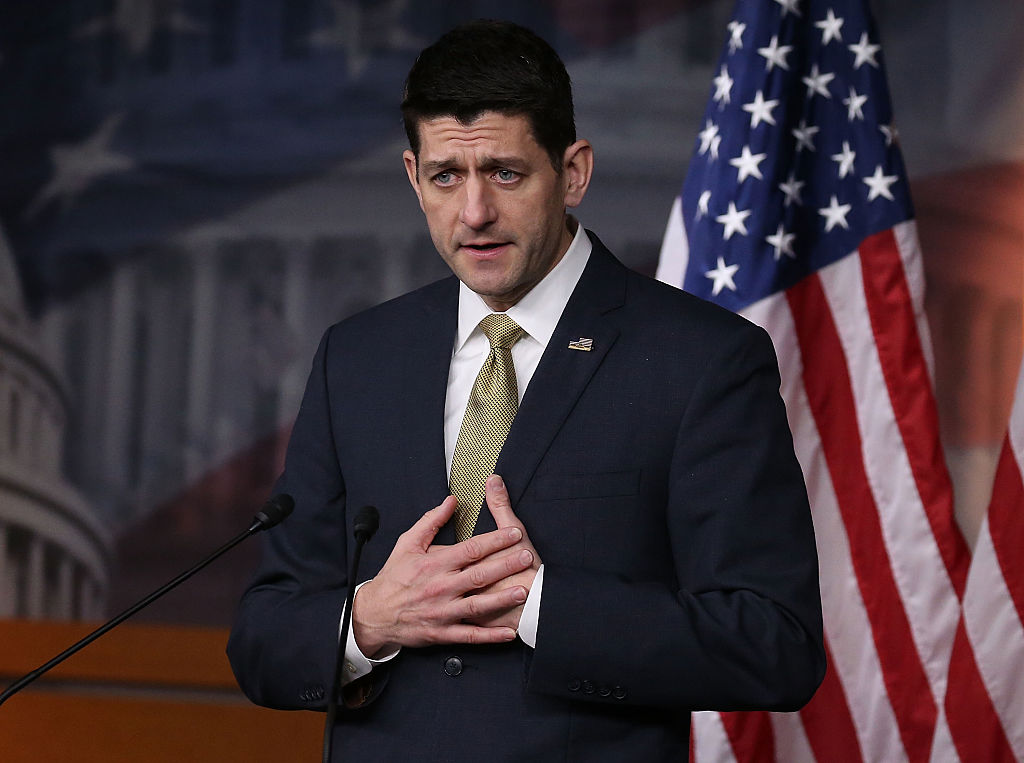Paul Ryan plans to 'get back next year at entitlement reform' to 'tackle the debt and the deficit'


A free daily email with the biggest news stories of the day – and the best features from TheWeek.com
You are now subscribed
Your newsletter sign-up was successful
On Wednesday, House Speaker Paul Ryan (R-Wis.) became the highest-ranking Republican to say publicly that the GOP plans to cut spending on Medicare, Medicaid, and welfare programs next year. "We're going to have to get back next year at entitlement reform, which is how you tackle the debt and the deficit," Ryan said on Ross Kaminsky's talk radio show. House and Senate Republicans are in negotiations on a final tax bill that nonpartisan analysts say would add at least $1 trillion to the deficit, and they recently authorized $700 billion in 2018 spending for the Pentagon, but Medicare and Medicaid — which, along with Social Security, have their own dedicated payroll tax — are "the big drivers of debt," Ryan said.
President Trump promised during the 2016 presidential campaign that he would not touch Medicare, Medicaid, or Social Security, but Ryan said he's been successfully selling Trump on the idea. "I think the president is understanding choice and competition works everywhere, especially in Medicare," he said. Social Security will probably escape, Ryan added, because it can't be changed under Senate budget reconciliation rules, meaning Republicans would need some Democratic support.
In the last two weeks, Sen. Marco Rubio (R-Fla.) and House Financial Services Committee Chairman Jeb Hensarling (R-Texas) have also proposed cutting Medicare and Medicaid after the tax bill, to tame the national debt. Ryan added welfare programs to the mix, telling Kaminsky, "We have a welfare system that's trapping people in poverty and effectively paying people not to work."
The Week
Escape your echo chamber. Get the facts behind the news, plus analysis from multiple perspectives.

Sign up for The Week's Free Newsletters
From our morning news briefing to a weekly Good News Newsletter, get the best of The Week delivered directly to your inbox.
From our morning news briefing to a weekly Good News Newsletter, get the best of The Week delivered directly to your inbox.
A free daily email with the biggest news stories of the day – and the best features from TheWeek.com
Peter has worked as a news and culture writer and editor at The Week since the site's launch in 2008. He covers politics, world affairs, religion and cultural currents. His journalism career began as a copy editor at a financial newswire and has included editorial positions at The New York Times Magazine, Facts on File, and Oregon State University.
-
 Political cartoons for February 14
Political cartoons for February 14Cartoons Saturday's political cartoons include a Valentine's grift, Hillary on the hook, and more
-
 Tourangelle-style pork with prunes recipe
Tourangelle-style pork with prunes recipeThe Week Recommends This traditional, rustic dish is a French classic
-
 The Epstein files: glimpses of a deeply disturbing world
The Epstein files: glimpses of a deeply disturbing worldIn the Spotlight Trove of released documents paint a picture of depravity and privilege in which men hold the cards, and women are powerless or peripheral
-
 Nobody seems surprised Wagner's Prigozhin died under suspicious circumstances
Nobody seems surprised Wagner's Prigozhin died under suspicious circumstancesSpeed Read
-
 Western mountain climbers allegedly left Pakistani porter to die on K2
Western mountain climbers allegedly left Pakistani porter to die on K2Speed Read
-
 'Circular saw blades' divide controversial Rio Grande buoys installed by Texas governor
'Circular saw blades' divide controversial Rio Grande buoys installed by Texas governorSpeed Read
-
 Los Angeles city workers stage 1-day walkout over labor conditions
Los Angeles city workers stage 1-day walkout over labor conditionsSpeed Read
-
 Mega Millions jackpot climbs to an estimated $1.55 billion
Mega Millions jackpot climbs to an estimated $1.55 billionSpeed Read
-
 Bangladesh dealing with worst dengue fever outbreak on record
Bangladesh dealing with worst dengue fever outbreak on recordSpeed Read
-
 Glacial outburst flooding in Juneau destroys homes
Glacial outburst flooding in Juneau destroys homesSpeed Read
-
 Scotland seeking 'monster hunters' to search for fabled Loch Ness creature
Scotland seeking 'monster hunters' to search for fabled Loch Ness creatureSpeed Read
